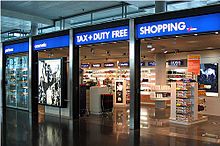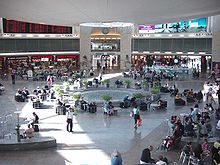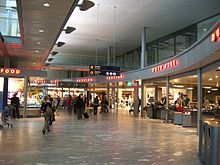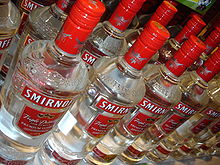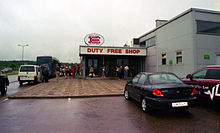- Duty-free shop
-
Duty-free shops (or stores) are retail outlets that are exempt from the payment of certain local or national taxes and duties, on the requirement that the goods sold will be sold to travelers who will take them out of the country. Which products can be sold duty-free vary by jurisdiction, as well as how they can be sold, and the process of calculating the duty or refund the duty component.
However, some countries impose duty on goods brought into the country, though they had been bought duty-free in another country, or when the value or quantity of such goods exceed an allowed limit. Duty-free shops are often found in the international zone of international airports and sea ports, but goods can be also bought duty-free on board airplanes and passenger ships. They are not as commonly available for road or train travelers, although several border crossings between the United States and Canada have duty-free shops for car travelers.
These outlets were abolished for travellers from EU countries within the European Union in 1999, but are retained for travelers whose final destination is outside the EU. They also sell to intra-EU travelers but with appropriate taxes. Some special member state territories such as Åland, Livigno and the Canary Islands, are within the EU but outside the EU tax union, and thus still continue duty-free sales for all travelers.
Contents
Duty-free outside the airports in the EU
Any traveller living in a country outside the EU VAT area is entitled to shop tax-free at participating shops in the EU. The traveller pays the VAT on goods in the shop in the usual way, and can request a refund when exporting the goods. To qualify, the traveller must:
- have residency in a non-EU country
- have a maximum stay of six months within the EU
- make purchases no more than three months prior to export
- obtain a form from the shop where he or she makes the purchase
- present the form, and in certain cases the goods, to a customs officer when leaving the EU, where they will be stamped
Only goods meant for personal use are eligible for the refund. The stamped forms and receipts can then be sent back to the retailers, or their agents, for a refund.
In most cases, a minimum purchase applies to use the tax-free shopping scheme. The actual amount of VAT reclaimable depends on the VAT rate applicable in the particular country to the goods purchased, and may be subject to a deduction for administration fees.
History
The world's first Duty Free shop was established at Shannon Airport in Ireland by Dr Brendan O'Regan in 1947[1] and is in service to this date. Designed to provide a service for Trans-Atlantic airline passengers typically travelling between Europe and North America whose flights stopped for refuelling on both outbound and inbound legs of their journeys, it was an immediate success and has been copied worldwide.
Duty free shopping was in its infancy when two American entrepreneurs, Charles Feeney and Robert Miller, created what is now Duty Free Shoppers (DFS) on 7 November 1960. DFS started operations in Hong Kong and spread to Europe and other places around the globe. Securing the exclusive concession for duty free sales in Hawaii in the early 1960s created a business breakthrough for DFS, and the company was positioned to focus on emerging Japanese travelers. DFS continued to innovate, expanding into off-airport duty free stores and large downtown Galleria stores and grew to become the world’s largest travel retailer. In 1996, LVMH Möet Hennessy Louis Vuitton acquired the interests of Mr. Feeney and two other shareholders and today jointly owns DFS with Mr. Miller.
In this same period, several locales grew as duty free shopping destinations. They are exemplified by Saint Martin and the U.S. Virgin Islands in the Caribbean, Hong Kong and Singapore. Still others claim prices competitive to duty free. Generally, goods are free of duty and tax levied on imports for sale anywhere in the shopping destination. Merchants may pay inventory/business or other taxes, but their customers usually pay none directly. Buyers must declare all purchases (duty-free or otherwise) as they enter any duty-levying country.
The mere absence of duty or other taxes on goods being sold does not assure that they are bargains. Costs of identical goods from different duty-free sources can vary widely. They often depend on the presence or absence of nearby competition, e.g., airport stores, especially if all at any airport are owned by a single firm such as Dufry.[2] Also, prices can often be driven upward by the costs of buyer convenience, e.g., in-flight sales by airlines. This July 2011 article discusses the economics of shopping in airport stores and others.
Duty-free shopping away from ports
Some duty free shops operate in central business districts away from airports or other ports. In Japan, for example, any visitor whose passport indicates that they have been in the country for less than six months can buy duty free items. Duty-free shops are also a mainstay in the Akihabara electronic shopping district of Tokyo.
In Thailand, the King Power chain has shops where duty-free items are pre-purchased and delivered separately to the airport to be picked up on departure. For certain other purchases, a VAT refund may be claimed at the airport upon departure.[3]
In the Philippines, other than shop outlets in airports there is also Duty Free mall called Duty Free Fiesta Mall which is located a few miles away from the Ninoy Aquino Airport. The goods that are sold in this mall are often imported products which come from around the world (mainly from USA, Asia and Australasia) which are not found in any other shopping malls in the country other than Duty Free malls. Most tourists, visitors and back-to-home citizens of Philippines pay a visit to these malls very often after their arrival (since, only arriving passengers can gain entry to the mall).[4] In order to gain entry, a passport is needed to be presented and registered at the Customer Registration Counter which is located at the entrance of the mall. The customer will then be issued a shopping card, these shopping cards must be presented to the cashier for sales validation of purchases. Duty Free malls before used to only accept US Dollars and Philippine peso but in recent years, Duty Free malls had begun accepting Japanese Yen, Brunei Dollar, Australian Dollar, British Pound, Canadian Dollar, Swiss Franc, Saudi Riyal, Bahrain Dinar, and Thai Baht. Currency Exchange booths are also available inside the mall if a customer wishes to exchange currencies into Philippine peso or US Dollars. Credits cards can also be used for purchasing goods.[5]
In Australia, duty-free shops have all but disappeared after the introduction of the GST in 2000. Currently, duty-free shops are nearly all located within international airports. Residents and tourists are now allowed to purchase virtually any physical good within 30 days of departure, which needs to be taken on the outward flight, and claim the GST component back through the Tourist Refund Scheme when passing through customs. Consumers are now free to fully use their items prior to departure. This is in contrast prior to 2000, where all purchases had to be packed by the duty-free store in a sealed clear plastic bag, and could only be broken open by customs staff just prior to departure.[6]
Security considerations
Travelers on long-haul routes with at least one transit stop between their departure airport and destination airport should be careful to purchase their duty free alcohol or perfume at the last transit port, as otherwise they may have it confiscated by security when they board at the transit port, as they will be exceeding the current limit on liquids in hand baggage. This does not apply to passengers transferring within the EU, Singapore and Croatia on the same day, as long as the liquid item is sealed in a plastic bag with the receipt showing in the bag. Arrivals Duty Free shops are now becoming more common. Most of South and Central America, and the Caribbean have such shops, as does SE Asia and Oceania. Switzerland and Canada are looking to introduce them in 2010, this method of retail removes any security problems for the transit of liquids as they are not carried on aircraft.[7]
Inbound duty free
Some countries, including Australia, Argentina, Iceland, India, Kenya, Malaysia, New Zealand, Norway, Sri Lanka, the Philippines, and Switzerland have inwards duty free facilities, where arriving passengers can purchase duty free items immediately before going through customs. This not only saves the inconvenience of having to carry these items around the world but also solves the security problem mentioned above. Other countries such as Canada and Sweden have been considering duty free on arrival.
Legal basis
It is a common feature of most tax systems that taxes are not raised on goods to be exported. To do so would place the goods at a disadvantage to those from other countries. Either the tax system allows the goods to be exported without taxes (stored prior to export in a bonded warehouse), or taxes can be claimed back when they are exported (see VAT).
Such exemption also applies to goods supplied for use on ships and aircraft, because they are consumed outside the country. Businesses supplying such goods can do so tax- and duty-free.
Goods sold to passengers on board ships or aircraft are tax free. The passenger can either consume them on board, or import them tax-free into the country they are traveling to, so long as they are within the traveler's duty-free allowance. Most tax regimes also allow travelers entering a country to bring in a certain amount of goods for personal use without paying tax on them, the so-called "duty-free allowance"; because it is not economically justifiable to collect the small amounts of tax involved, and would be an inconvenience to the passengers.
A duty-free shop works under the same system. The goods must be exported intact (they cannot be consumed in the airport), and they are importing into the destination country under that country's own tax rules. In some countries, in order to ensure that goods are exported intact, they are hand-delivered in a closed bag to the passenger at the gate after his ticket is scanned. In the United States, duty-free shops are technically considered class 9 Bonded Warehouses with regard to the U.S. Customs & Border Protection:
- Class 9. Bonded warehouse, known as duty-free stores, used for selling, for use outside the Customs territory, conditionally duty-free merchandise owned or sold by the proprietor and delivered from the Class 9 warehouse to an airport or other exit point for exportation by, or on behalf of, individuals departing from the Customs territory for destinations other than foreign trade zones. Pursuant to 19 U.S.C. 1555(b)(8)(C), Customs territory, for purposes of duty-free stores, means the Customs territory of the U.S. as defined in 101.1(e) of this chapter, and foreign trade zones (see part 146 of this chapter). All distribution warehouses used exclusively to provide individual duty-free sales locations and storage cribs with conditionally duty-free merchandise are also Class 9 warehouses.
Moreover, in the U.S. some duty-free stores will sell their goods to domestic passengers with appropriate taxes included. Alcohol and tobacco products are restricted to international passengers only and subject to the age limitations of 21 and 18 respectively, even though the age one must be to import those items into other countries may be lower.
Visiting U.S. protectorates
U.S. citizens receive substantially higher duty exemptions than normal when they visit or transit these locales, e.g., Guam, U.S. Virgin Islands. See [2] for precise details.
See also
- Fuel tax, jet fuel used in international flights is sold duty-free
References
- ^ "Brendan O'Regan". The Times. 2008-02-13. http://www.timesonline.co.uk/tol/comment/obituaries/article3358668.ece. Retrieved 2009-09-05.
- ^ [1]
- ^ http://www.thaiwaysmagazine.com/tips/vat_refund.html
- ^ http://www.dfp.com.ph/modules/content/index.php?id=1
- ^ http://www.dfp.com.ph/modules/content/index.php?id=5
- ^ http://www.customs.gov.au/webdata/resources/files/travellers___english1.pdf
- ^ Kaye, Ken (March 24, 2007). "Passengers lose their booze as TSA alcohol rules are ignored". Sun Sentinel. http://articles.sun-sentinel.com/2007-03-24/news/0703230780_1_tsa-officials-carry-on-bags-bottles. Retrieved December 28, 2010.
External links
- The Moodie Report - Duty Free & Travel Retail News Website
- TREND-News.com - Duty Free & Travel Retail News
- Duty Free on Arrival - Global duty free and tax free shopping search portal
Categories:- Retailing
- Customs duties
- Borders
Wikimedia Foundation. 2010.

